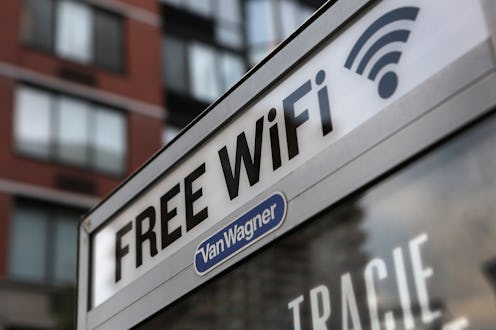News
Want To Keep Your Firstborn? Don't Do This
Remember the last time you downloaded a song, registered for a flash-deal site, or started yet another Tumblr? When you reached the terms and conditions page, did you actually read all those tiny, dense words? Chances are: nope, not at all. We can all admit to scrolling past the fine print and heading straight for the Agree button. Now, Internet security firm F-Secure has effectively called us out on our lazy behavior by conducting a clever experiment that saw many Wi-Fi users literally signing away their firstborn because they hadn't read the fine print.
Finland-based Internet security firm F-Secure, whose slogan is "Protect your life on every device," worked in collaboration with Europol to set up an unsecured Wi-Fi hotspot in a busy area in London. The experiment was intended to test Londoners' knowledge of hotspot security and observe how careful they are with their personal data. The results were pretty alarming.
When users tried to connect to the Wi-Fi, they were presented with a long page of terms of conditions, which many of us consider to be text wallpaper that you have to scroll past in order to proceed. What set the experiment's terms and conditions apart, however, was a "Herod clause," which stated that upon checking the Agreed box, "the recipient agreed to assign their first born child to us for the duration of eternity." Six people signed away their first bundle of joy.
Your Personal Data Is More Exposed Than You Think
But babies weren't even the only thing these unknowing study participants freely gave away. The study also aimed to assess how much personal data an average Wi-Fi user leaks to the network. After the researchers removed the terms and conditions, another 33 devices opted to connect, exposing their personal data to the hotspot administrators. What kind of personal data? Emails, texts, addresses, passwords — the works.
We Make It Easy For Criminals
So what does this experiment conclude? Hackers and criminals have it easy. Not only do we make it easy for them with our unscrupulous habits, but the experiment itself, using a device that costs just over $300, is one that any hacker can replicate. In fact, criminals have already set up similar hotspots around the world for the very purpose of accessing your data. On top of that, criminals also target official hotspots with minimal security to seek out personal data.
How Can We Protect Ourselves?
The solution to this pervasive danger is simple. Try to avoid using public Wi-Fi as much as possible, and remember to keep your Wi-Fi turned off on your phone when you're in public. But if you must sign on at your local Starbucks, try using a Virtual Private Network (VPN), which encrypts the data that is sent to and from the hotspot.
Watch the experiment below.
Images: Getty Images (3)
